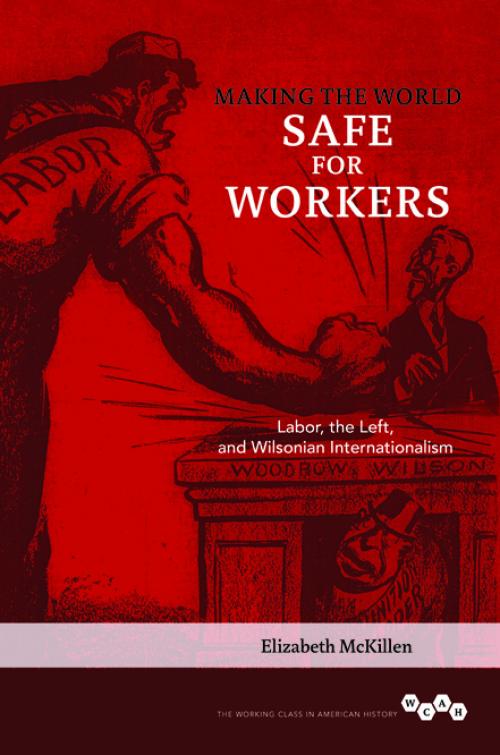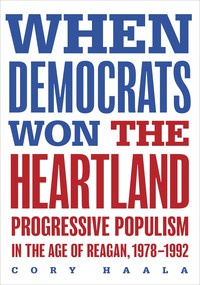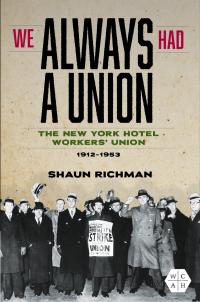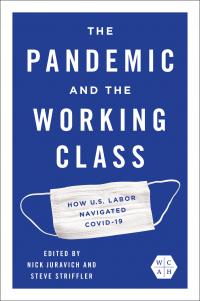
Making the World Safe for Workers
Cloth: 11/04/2013
About the Book
In this intellectually ambitious study, Elizabeth McKillen explores the significance of Wilsonian internationalism for workers and the influence of American labor in both shaping and undermining the foreign policies and war mobilization efforts of Woodrow Wilson's administration. During his presidency, Wilson contended with strong anti-imperialist and antiwar currents that coursed through the U.S. labor movement as well as revolutionary upheavals and labor unrest abroad that undermined his diplomatic initiatives. McKillen highlights the major fault lines that emerged within labor circles as Wilson pursued his agenda in the context of Mexican and European revolutions, World War I, and the Versailles Peace Conference.McKillen's spotlight falls particularly on the American Federation of Labor, whose leadership collaborated extensively with Wilson, assisting with propaganda, policy, and diplomacy. AFL founder Samuel Gompers eventually served as an advisor to the Wilson administration at Versailles and played a leading role in shaping the peace treaty's labor provisions and constructing the International Labor Organization. At the same time, McKillen asserts, other labor groups (and even sub-groups within the AFL) vehemently opposed Wilsonian internationalism. Abroad, the Wilsonian vision faced challenges from both European labor moderates and communists. Among U.S. groups, particularly effective opposition came from the U.S. Socialist Party, which framed the debate over democratic control of industry as an anti-war and anti-imperialist issue. Irish Americans and German Americans, spurred by European labor leaders and seeking support for revolution in their homelands, also joined sides against Wilson, as did the IWW and left-leaning African American and women workers.
Even as the AFL leadership toiled on Wilson's behalf, a shifting coterie of these oppositional groups mounted sophisticated critiques. They deconstructed propaganda, staged strikes, and built surprising political alliances; ultimately, they undermined Wilson's agenda to the point that he was unable to realize some of his dearest international ambitions. As McKillen shows, the choice to collaborate with or resist US foreign policy remained an important one for labor throughout the twentieth century. In fact, it continues to resonate today in debates over the global economy, wars in Iraq and Afghanistan, and the impact of US policies on workers at home and abroad.
About the Author
Elizabeth McKillen is a professor of history at the University of Maine and the author of Chicago Labor and the Quest for a Democratic Diplomacy: 1914–1924.Reviews
"A masterpiece of historical scholarship that blends finely grained institutional analysis of the labor movement, a bottom-up account of foreign policy, and a fascinating story of policy making. Highly recommended."--Choice"McKillen shows the strength of the antiwar impulses within American labor. An important breakthrough."--The Journal of American History
"McKillen's treatment of the conflict within the house of labor is clearly written, fairly argued, and copiously documented. Whether or not one agrees with McKillen's assertions, this work makes for compelling reading and raises many questions still relevant today."--Labor Studies Journal
"A well-written narrative that draws on diverse schools of scholarship, including labour, gender, Black, borderland, immigration, and international relations. Making the World Safe for Workers is an enlightening study of an undeservedly forgotten chapter in modern history."--Labour/Le Travail
"An intelligent reading of the complicated politics of labor involvement in the making of U.S. foreign relations in the Wilson era. It makes an important contribution by adding to our understanding of the bitter divisions that split labor in the U.S. and around the world."--American Historical Review
"McKillen's text is a valuable addition to both the fields of US diplomatic and labour history, and redresses the balance of many previously under-analysed aspects of Woodrow Wilson's foreign policy."--European Journal of American Studies
"On the whole, McKillen’s Making the World Safe for Workers makes a major contribution in our understanding of domestic opposition to and support for World War 1 and Wilsonian diplomacy."--Canadian Journal of History
"McKillen is an enthusiastic advocate of transnational history, and this book advances her cause. It is richly documented and keenly analytic. Space forbids a full discussion of many of the issues she raises. Everyone interested in transnational labor history should read it." --Journal of the Gilded Age and Progressive Era
"A book about the First World War. . . which teaches us much about the world of today."--Brood en rozen [Bread and Roses]
"With her new book, Elizabeth McKillen makes another significant contribution to labor and diplomatic history."--Register of the Kentucky Historical Society
"Elizabeth McKillen makes the bold claim that a diverse range of working-class activists and left-wing radicals helped guide, shape, an weaken the foreign policy of President Woodrow Wilson, especially concerning American involvement in the First World War. McKillen tells this wide-ranging, often complicated story with tremendous skill. This book should be of interest to scholars and students of American and European labour history, particularly those with interest in labour politics or the era of the First World War."--Labour History Review
Blurbs
"Impressively researched, this excellent study makes a major contribution to the history of the U.S. labor movement and to the history of Woodrow Wilson's foreign policy. McKillen's focus on Wilson's approach to labor, World War I, and peacemaking provides a welcome counter to the dominant historiography on Wilson's relations with leftist progressives and socialists."--Ross A. Kennedy, author of The Will to Believe: Woodrow Wilson, World War I, and America's Strategy for Peace and Security
"Elizabeth McKillen tells a big and far-flung story exceptionally well. This book succeeds in showing how U.S. and European trade unions and socialist groups' conflicted efforts to democratize diplomacy changed the larger story of successful American opposition to Wilsonian internationalist goals."--David R. Roediger, coauthor of The Production of Difference: Race and the Management of Labor in U.S. History






